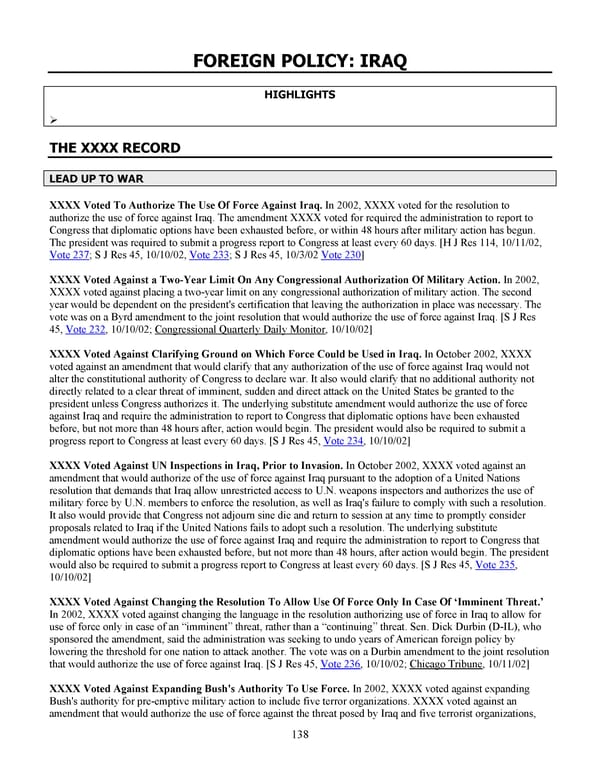FOREIGN POLICY: IRAQ HIGHLIGHTS THE XXXX RECORD LEAD UP TO WAR XXXX Voted To Authorize The Use Of Force Against Iraq. In 2002, XXXX voted for the resolution to authorize the use of force against Iraq. The amendment XXXX voted for required the administration to report to Congress that diplomatic options have been exhausted before, or within 48 hours after military action has begun. The president was required to submit a progress report to Congress at least every 60 days. [H J Res 114, 10/11/02, Vote 237; S J Res 45, 10/10/02, Vote 233; S J Res 45, 10/3/02 Vote 230] XXXX Voted Against a Two-Year Limit On Any Congressional Authorization Of Military Action. In 2002, XXXX voted against placing a two-year limit on any congressional authorization of military action. The second year would be dependent on the president's certification that leaving the authorization in place was necessary. The vote was on a Byrd amendment to the joint resolution that would authorize the use of force against Iraq. [S J Res 45, Vote 232, 10/10/02; Congressional Quarterly Daily Monitor, 10/10/02] XXXX Voted Against Clarifying Ground on Which Force Could be Used in Iraq. In October 2002, XXXX voted against an amendment that would clarify that any authorization of the use of force against Iraq would not alter the constitutional authority of Congress to declare war. It also would clarify that no additional authority not directly related to a clear threat of imminent, sudden and direct attack on the United States be granted to the president unless Congress authorizes it. The underlying substitute amendment would authorize the use of force against Iraq and require the administration to report to Congress that diplomatic options have been exhausted before, but not more than 48 hours after, action would begin. The president would also be required to submit a progress report to Congress at least every 60 days. [S J Res 45, Vote 234, 10/10/02] XXXX Voted Against UN Inspections in Iraq, Prior to Invasion. In October 2002, XXXX voted against an amendment that would authorize of the use of force against Iraq pursuant to the adoption of a United Nations resolution that demands that Iraq allow unrestricted access to U.N. weapons inspectors and authorizes the use of military force by U.N. members to enforce the resolution, as well as Iraq's failure to comply with such a resolution. It also would provide that Congress not adjourn sine die and return to session at any time to promptly consider proposals related to Iraq if the United Nations fails to adopt such a resolution. The underlying substitute amendment would authorize the use of force against Iraq and require the administration to report to Congress that diplomatic options have been exhausted before, but not more than 48 hours, after action would begin. The president would also be required to submit a progress report to Congress at least every 60 days. [S J Res 45, Vote 235, 10/10/02] XXXX Voted Against Changing the Resolution To Allow Use Of Force Only In Case Of ‘Imminent Threat.’ In 2002, XXXX voted against changing the language in the resolution authorizing use of force in Iraq to allow for use of force only in case of an “imminent” threat, rather than a “continuing” threat. Sen. Dick Durbin (D-IL), who sponsored the amendment, said the administration was seeking to undo years of American foreign policy by lowering the threshold for one nation to attack another. The vote was on a Durbin amendment to the joint resolution that would authorize the use of force against Iraq. [S J Res 45, Vote 236, 10/10/02; Chicago Tribune, 10/11/02] XXXX Voted Against Expanding Bush's Authority To Use Force. In 2002, XXXX voted against expanding Bush's authority for pre-emptive military action to include five terror organizations. XXXX voted against an amendment that would authorize the use of force against the threat posed by Iraq and five terrorist organizations, 138
 HRC vote skeleton Page 150 Page 152
HRC vote skeleton Page 150 Page 152